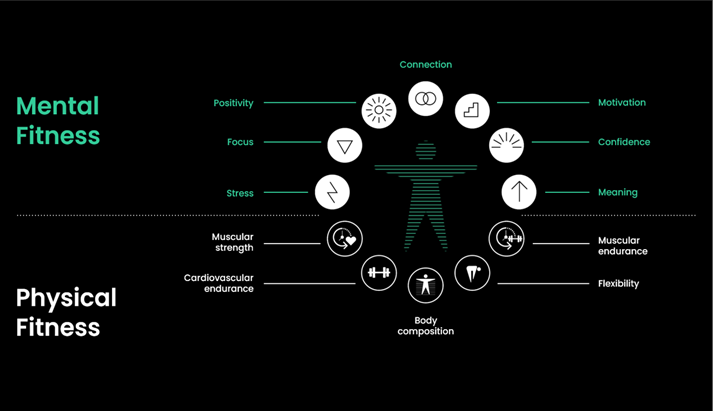Claim learners’ certificates by Friday 11 July. If your qualification doesn’t include an external assessment and learners are expecting results in August, make sure to claim certificates by this date. For qualifications with external assessments, claim within two working days of receiving confirmed results. Find out more on our timely delivery of results page.
5 mental fitness techniques for teachers and leaders
Marking Mental Health Awareness week was the AoC’s Mental Health and Wellbeing Conference 2022, a two-part event creating a space for learning from others and developing thinking around how to further progress mental health and wellbeing work across colleges.
We closed out part 1 of the conference by hosting a session on mental fitness in education in collaboration with mental fitness platform Fika. The session explored how mental fitness can help us to train for life, in the same way that physical training can help us to prepare for a marathon. It’s only when we reach burnout that we look for support – but if we can develop the mental skills we need to support us ahead of time, these can support us along the way,
Here, we summarise 5 key mental fitness techniques as suggested in the session, which was hosted by Craig Wade, Sector Manager for Health, Science and Social Care at NCFE, and Dr Amanda McNamee, Senior Mental Fitness Scientist at Fika.
1. List 3 good things at the end of your day
Make time to reflect for 5 minutes at the end of your working day and identify 3 good things that happened. They don’t need to be life-changing events – for example, it could be that you went out for a walk before starting your working day, or that you received a message from a loved one that made you smile.
Research has shown that we can speak about negative or bad events up to nine times more than positive ones. But taking time to focus on the good helps us to shift our focus from negative happenings to positive ones, as well as helping to reduce fatigue and build stronger relationships.
We also encourage you to write these down, to inspire reflection and cement these positive feelings. Are there any habits you could build this activity into, such as leaving your list visible on your desk ready for when you start work the next morning?
2. Create a ‘Don’t Do’ list
We’re all familiar with the concept of a to do list – but Dr Amanda recommends starting your day by creating your own don’t do list. This could be something as simple as deciding not to volunteer to take on work beyond your capacity this week, or choosing not to reply to messages or emails instantly.
We often hold ourselves to high standards, thinking that if we don’t reply to messages from colleagues or students instantly, they may think we don’t care. But is this how you feel about your colleagues or students when they don’t reply to you? Probably not!
Could you agree as a team that whilst exam season is taking place, emails will only be responded to on set days or times? Could you manage expectations by adding this information to your email footer? Setting barriers and feeling comfortable with them is an integral part of mental fitness training, and the ‘Don’t Do’ list is an active commitment to stop putting unnecessary pressure on yourself.
3. Build connection into your working day
The main theme of this year’s Mental Health Awareness Week is loneliness – as reported by the Mental Health Foundation, severe loneliness and poor mental health are interlinked and can make each other worse. Feeling disconnected and isolated can be a difficult issue to address when we’re already so busy and struggling for time. So how can we build connection into our current routines?
The key is to use the time that you’re already using to do something with someone else. Is the final hour of your day spent marking alone in your office? If so, why not find a colleague who can join you for a working session? You can focus together and use the Pomodoro technique to work in 2 x 25-minute blocks, taking a short break in between sessions.
The connections we have can help us to achieve more, as well as perform better in the workplace and in exams. Use the time you already have to integrate mental fitness activities into your day.

A slide from the session demonstrating the elements of both mental and physical fitness
4. Lead by example
A big part of being an educator and/or a leader is modelling these behaviours and leading by example. Be confident in your approach and block out your lunchtimes as being ‘non-contactable’, or even put time into your calendar to complete your ‘3 good things’ as a recurring reminder at the end of each day.
Furthermore, could the activities listed here be shared with your students to help build critical mental training activities into their own day-to-day? For example, could you invite students to come along and work in silence with you to demonstrate the power of shared connection? Could they benefit from reflecting on their day and listing the positives?
5. Work on developing all 7 key skills
Working on our mental fitness 3 times a week for 5 minutes at a time has had a proven impact on self-efficacy, positive affect and life satisfaction. It also shows that a balanced mental fitness approach can lead to a decreased chance of burnout and an increased chance of engagement.
Fika has determined that there are 7 key skills when it comes to achieving mental fitness balance, which are:
- connection
- motivation
- confidence
- meaning
- positivity
- focus
- stress.
We’ve spoken in particular about how to improve connection and positivity in this article – but as we know, doing leg day every day in the gym isn’t going to achieve an even spread of overall body strength!
In the same way, we need to ensure that we’re working on all 7 mental fitness skills to feel balanced and prepared for a range of situations. Regular use of the Fika app provides access to a range of exercises and activities that allow users to train across all 7 skills.
Through our partnership with Fika, we’ve so far been able to reach 69 colleges, supporting 31,000 users and delivering over 29,000 hours of mental fitness training. To read more about or work with Fika or to learn how to get started, visit our Fika hub.
Working on our mental fitness 3 times a week for 5 minutes at a time has had a proven impact on self-efficacy, positive affect and life satisfaction.

Case study: Checking in with yourself and building mental fitness
Since signing up to Fika in June 2021, Shrewsbury College Group has supported over 700 individuals to complete an incredible 363 hours of mental fitness training. Here, we hear how users have benefitted.
Read more
Watch: A personal journey that led to a changed perception of mental health
Nick Bennett shares a personal TEDx talk, sharing the story behind the creation of Fika – an app-based programme helping users to improve their mental fitness and deal with stress management
Read more
How educators can help learners turn exam stress into academic success
By using Fika, learners are equipped with the stress management skills necessary to tackle exam season head-on, helping to turn exam stress into academic success.
Read more

